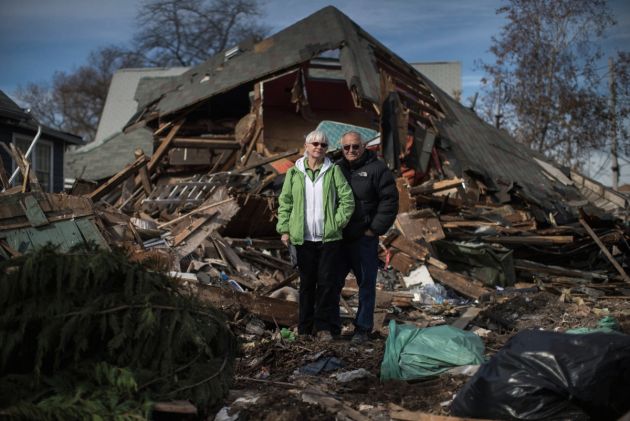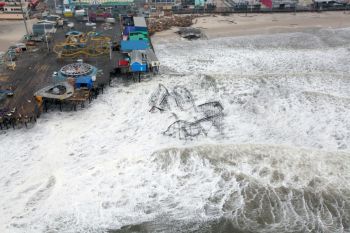Survey: Americans turn to God after natural disasters

A recent poll has found that most Americans take more interest in God after natural disasters.
The survey was conducted by Lifeway Research shortly after devastating tornadoes in Oklahoma on May 20 killed two dozen people and inflicted billions of dollars in damage,
Lifeway reporter David Roach reported the results on the organization's website.
Nearly six in 10 Americans (57 percent) agreed with the statement, "When a natural disaster occurs, my interest in God increases."
Thirty-one percent disagreed with the statement and 12 percent said they don't know,
One of the questions asked respondents, "How do you feel about when suffering occurs that appears unfair?"

The top answer was "I trust God more" (33 percent).
Other answers were:
–"I am confused about God" (25 percent).
–"I don't think about God in these situations" (16 percent).
–"I wonder if God cares" (11 percent).
–"I doubt God exists" (7 percent).
–"I am angry toward God" (5 percent).
–"I am resentful toward God" (3 percent).
Lifeway Research also found that women, people with a college degree, and those who attend worship services once a week are likely to be more interested in God during a disaster than others.
Other findings of the study include:
* Most Americans doubt prayer can avert natural disasters.
* When a natural disaster occurs, most Americans trust faith-based groups to be more responsible than secular groups with their donations.
* Almost 60 percent of Americans donate to relief agencies after a natural disaster.
The survey of 1,040 American adults was conducted May 23-24, 2013.
Ed Stetzer, president of Lifeway Research, said on his blog, "Disasters, particularly natural disasters, perplex all of us. While some call them 'acts of God,' others question why a good and loving God would do such a thing."
"The fact is, God does not give us all the answers," Stetzer said. "But, as Christians, we believe that God gives us Himself – and that is why we have faith. Faith is believing God when you don't have all the answers. But, disasters test that faith – some people draw closer to God, some pull away."
Adam Hunter, senior editor of the devotional magazine Guideposts wrote after the tornadoes in Oklahoma, "Leaning on God for hope, comfort and strength after a tragedy doesn't ignore the realities of what has happened. It doesn't lessen the tragedy. But it does help us recover and rebuild."
Hunter was refuting an argument made by Mark Joseph Stern of Slate.com, who wrote, "Any God powerful and attentive enough to save survivors' lives should also be powerful and attentive enough to stop the catastrophe in the first place.
"It's insulting, futile and distracting from the reality of natural disasters to inject your god into a calamity like Oklahoma's."
In his article, "Don't Pray for Oklahoma", Stern complained about journalists who reported on the frequent references to God made by survivors.
Forty-four percent of Americans believe that natural disasters are a sign from God, according to a poll reported in 2011 by LiveScience.com. Even more evangelicals hold that view.
Rev. Mark Creech, a columnist for the Christian Post, agrees with the opinions of Americans who believe that God is trying to speak through natural disasters.
On Monday he wrote that approximately 75 natural disasters have occurred in America in the last five months. Creech said the frequency of these events cannot be explained about by global warming or better reporting.
He said, "Anyone with a little age and experience, or any one simply willing to carefully consider matters, finds it a bit hard to believe that what's been occurring of late is merely the natural cycle of things.
"The succession and intensity of these incidents have rightly caused people to sense something isn't right in the earth, and the scientific data alone can't effectively elucidate the cause."
The people in Oklahoma or anywhere else are not experiencing climatic catastrophes because they are more wicked than anyone else, said Creech, but because God is sending a "wake-up call".
"His desire is to bless with kindness – to shelter, defend, and prosper," he said. "But if we insist on ignoring his Sovereignty, spurning his law, and exalting our own way paramount to his will, then we separate ourselves from the very source of all blessing.
"God loves us too much to leave us that way without using whatever means necessary to move our gaze from downward to upward."